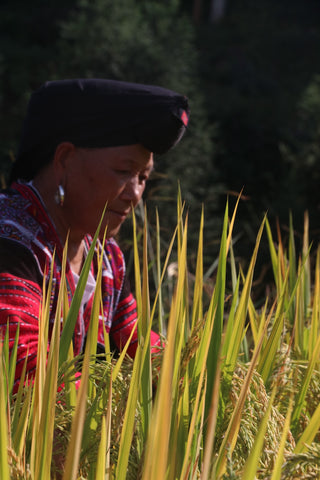
At Viori, we sometimes receive inquiries from our customers curious about the farming practices of the Red Yao people. Understanding the origins of our food, ingredients, and raw materials is essential, as it allows us to make informed choices about what we consume. Today, we'd like to share an update on the farming practices in the terraced fields of Longsheng.
You may already know that our Longsheng Rice is grown in all-natural ways, but it's not yet labeled as organic. Obtaining organic certification is a lengthy and costly process, which many small-scale farmers or farmer cooperatives struggle to afford. To give you an idea, the costs involved include new equipment required according to organic standards, inspection fees, application costs, membership fees, and more. It's no wonder many farmers find it challenging to obtain this certification!
Recognizing these challenges, Viori decided to step in and support the farmers' cooperative by sponsoring all the costs associated with obtaining organic certification almost two years ago (one of our Beautiful Reason Initiatives).

Fast forward to today, and we're proud to say that we're in the third year of this journey. If we pass this year's inspection, Longsheng rice will finally be certified as organic. This certification will be a significant milestone for the local farmers, making their rice easier to sell and attracting more attention to their produce.
Now, let's dive into the farming practices that have been adopted during this journey towards organic certification. One of the new practices introduced has been crop rotation. In the past, rice paddies would remain empty and dry during the non-growing rice season. However, with the use of natural fertilizers being controlled, farmers are now required to adopt other local methods to improve soil fertility and health.

This year, the cooperative, in collaboration with the certification body, decided to introduce turnip as a suitable crop for the off-season. Turnips are not only used in local dishes and serve as excellent food for livestock, but they also enrich the soil with extra nutrients. Crop rotation offers several benefits, such as reducing soil erosion, improving soil structure, and controlling pests and diseases naturally.

As we look forward to the upcoming rice season starting next month, we'll be sure to provide you with another farming update. In the meantime, we're grateful for your continued support and interest in the journey towards sustainable and organic farming in Longsheng.
Stay tuned for more updates, and thank you for being a part of this exciting journey with us!


